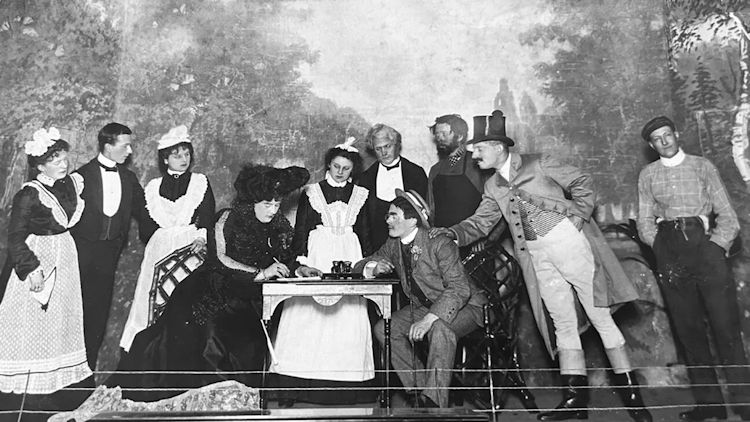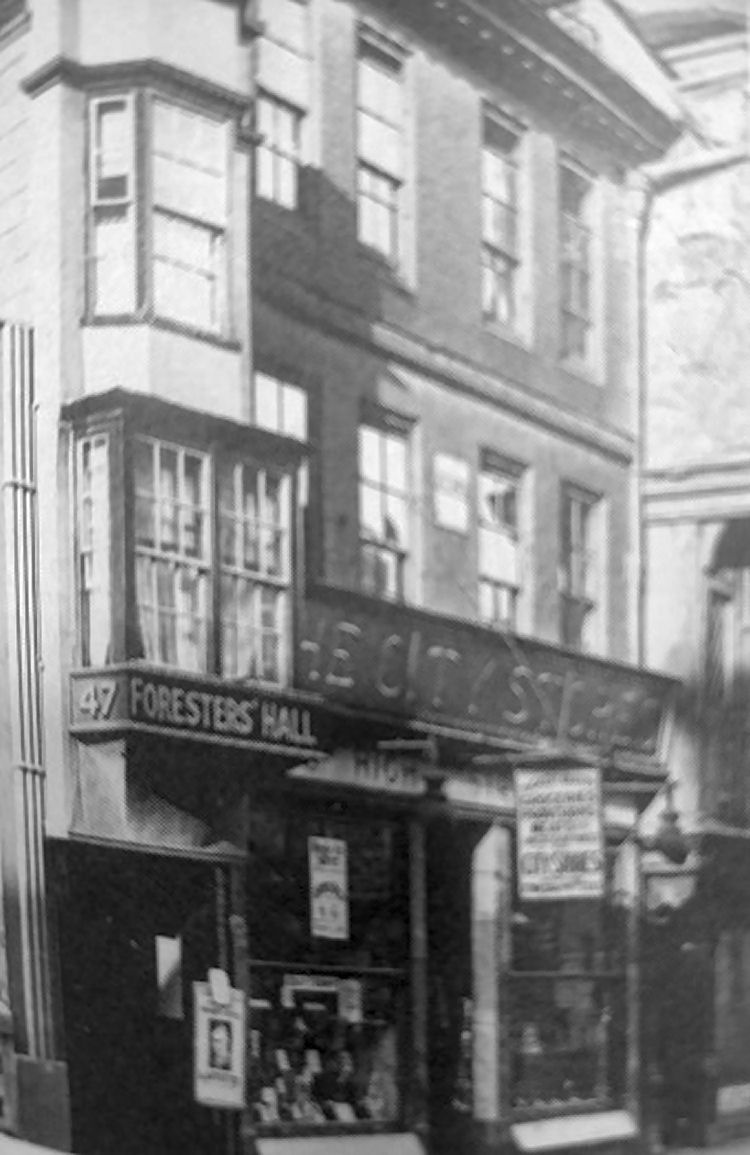|
47 High Street
Canterbury

Above photo, 1901. Kindly sent by Rory Kehoe. A publicity still from an
early example of local "crowdfunding!" An (as yet) unknown ensemble of
players performed two short plays, Withered Leaves and Checkmate, on two
evenings at the Foresters' Hall, in order to help raise money for the
widow and six children of the late Postman Brown. Don't think it was his
post that was late though. |

Above photo 1920s, kindly sent by Rory Kehoe. |

Above showing part of a postcard, date unknown. |
I am not sure how valid this one is as I do not have an address or indeed
a definite date. However, the name of the pub was mentioned in a
Song or Poem of Canterbury,
that was written around 1885.
Further research tells me it was called the "Forester's Hall" at 47
High Street
|
From the Canterbury Journal and Farmers' Gazette, Saturday, 29 January, 1887.
Foresters Nigger Opera Troupe.
The Foresters' Hall, Canterbury, was crowded to excess on Thursday
evening last on the occasion of the first performance of this newly
formed band of Minstrels. There was a large and efficient orchestra, and
the whole entertainment passed off wonderfully well, and thoroughly
delighted the audience. The first part of the performance consisted of
the following program:- Opening chorus, "Strike the chords of pleasure,"
the Troupe; song (comic), "Oh dem golden slippers," Mr. May; serenade,
"Beautiful dreamer," Mr. Bodkin; song, (comic), "Oh Lucinda," Mr. Enston;
song, "The old man's secret." Mr. Atterbury, song, (comic), "Massa's
sent a jellygram." Mr. O'Neill; galop, "Belle Mehone," the Troupe. (The
whole of the songs were sung by permission of the Mohawk Minstrels.)
Part II. was as follows. Banjo song, "We are in the swim, boys," Mr.
O'Neill (with chorus by the Jubilee singers in the distance); stump
oration, Mr. S. B. Pettit; reported of the New York Watchmen, Mr.
Muggleton, comic sketch, Messrs. Enstone and Tomalin. Then followed a
very amusing sketch entitled "Out of collar." The following was the
caste:- Professor Blackhead. R.A.M., Mr. S. B. Pettit, Joe (his
servant), Mr. Euston; Buggins (a trombone player, Mr. Muggleton; Cuggins
(a benighted traveller), Mr. Atterbury; Duggins (a banjoist), Mr.
Thomalin, Fuggins (a banjoist), Mr. O'Neil; Gugging (a tregedian), Mr.
Dunne; Huggins (a modern Sampson), Mr. Davey; Juggins (a modern
Hercules,) Mr. Constant; Luggins (a modern Daniel Lambert), Mr. Barden;
Muggings (a concertansiat), Mr. Barrow; Nuggins (a concertinaist), Mr.
Forrester; Puggins (and operatic singer), Mr, Muggleton; Quggins (an
operatic singer), Mr, Milton Small; Ruggins (a step dancer), Mr. May;
Suggins (a step dancer), Mr. O'Neil; Tuggins (a cornet player), Mr.
Belsey. The Indian contingent (the vocalist of the troupe), in
conclusion, sang part of the soldiers' choruses from "I Puritani" (Bellini);
and "Faust" (Gouned). Mr. E. M. Small was a stage manager, and Mr. S.
Mills the hon. secretary; great credit is due to both for the excellent
way in which the whole entertainment had been got up. So many
applications for admission having to be refused in consequence of their
not being sufficient accommodation in the Hall, it was decided to repeat
the performance on Wednesday evening.
|
|
From the Whitstable Times, 25 January, 1902.
“MANURES FOR GARDENS.”
This was the title of a very interesting and instructive lecture given
by Mr. A. D. Hall (Principal of the South Eastern Agricultural College,
Wye), at the "Foresters’ Hall," Canterbury, on Tuesday evening, in
connection with the Canterbury Gardeners’ Mutual Improvement Society
under the Technical Education grant they received from the Canterbury
Town Council. The Mayor of Canterbury (Alderman G. Collard) pre- aided,
and was supported on the platform by the Sheriff (Councillor F. T.
Gentry), Councillor T. Wood, Mr. A. D. Hall, and Mr. J. McClemens
(Secretary of the Gardeners’ Society). The Mayor, in introducing Mr.
Hall, referred to the little unpleasantness that was rife in the Society
at present, and sincerely hoped that it would soon blow over, and that
the Society would again he under the able management that it had been in
the past.
Mr. Hall, who was heartily received, gave his lecture on “Manures for
Gardens,” and he was attentively listened to from start to finish. He
spoke of the use of manures on land, and said that land must he fed by
the three substances—nitrogen, phosphoric acid, and potash. He then
traced the use and effect of these three substances, and gave the
gardeners some practical advice when buying artificial manures. He
described with some detail the application of manures on different
soils.
At the close a note of thanks was passed to Mr. Hall, on the proposition
of the Mayor, seconded by the Sheriff, and a like compliment was paid
the Mayor for presiding, on the proposition of Councillor Wood, seconded
by Mr. McClemens.
|
LICENSEE LIST
|


